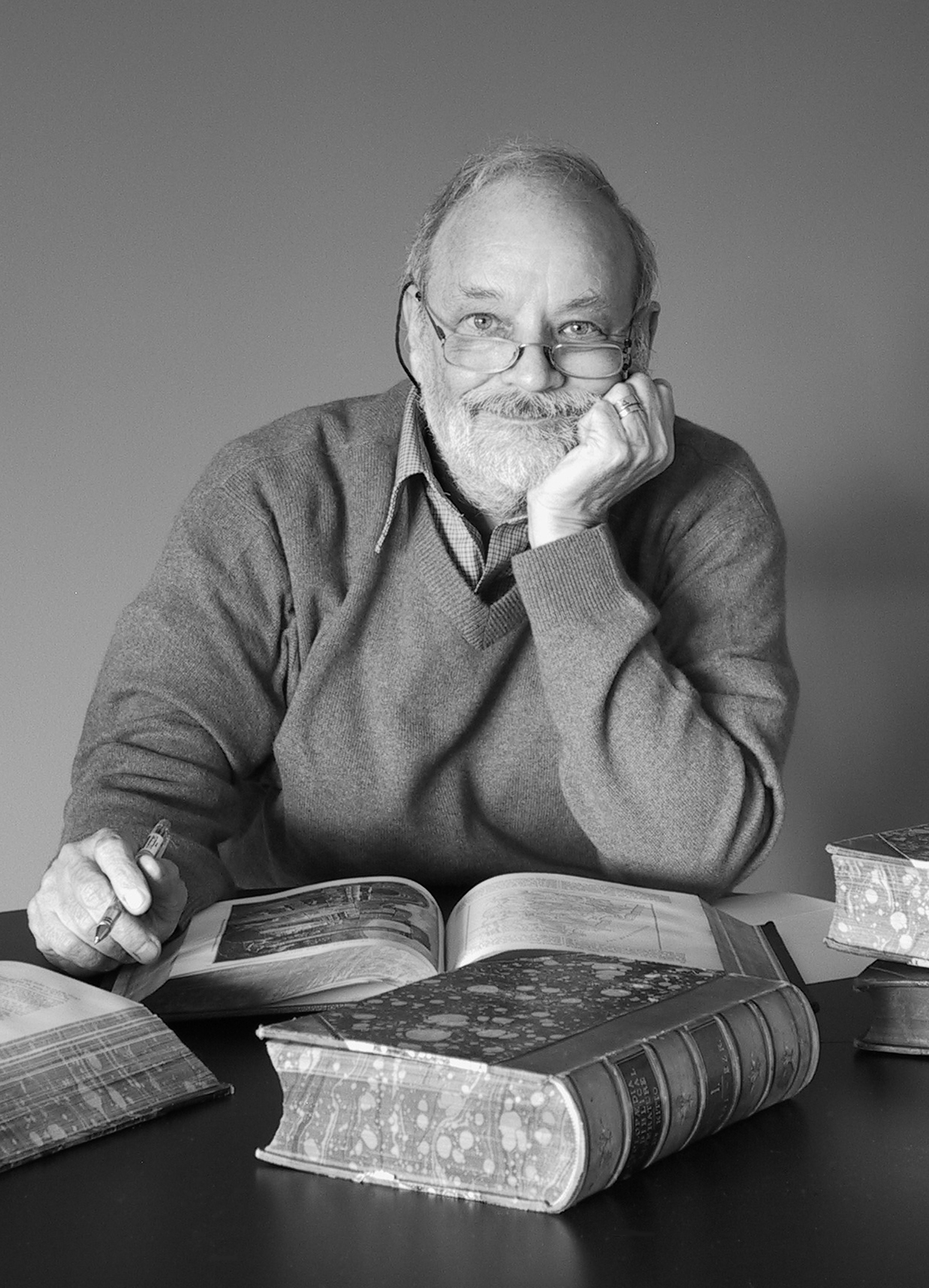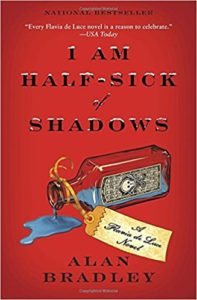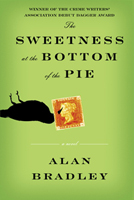In Quires, In Books
This page is dedicated to book reviews…
For what I’m currently reading, you can find me on GoodReads here.
I Am Half-Sick of Shadows: A Delightful Holiday Treat
As we near the holidays, I’m reminded of this fun little read – a review I did for The Globe & Mail on Alan Bradley’s continuing Flavia de Luce series.
I reviewed the first novel in the series for DiscoveryChannel.ca, and that can be seen below.
The Sweetness at the Bottom of the Pie a refreshing concoction
If you condensed Sherlock Holmes’s deductive abilities, Madame Curie’s talent for chemistry, and Dr. Jekyll’s zeal into the mind of an 11-year-old, her name would be Flavia de Luce.
The brainchild of Canadian author, Alan Bradley, Flavia is an unexpected hero to grace the pages of a murder mystery, and a review on this blog.
But she is well-worth both.
Here is why:
A compelling, science-tinged plot…
Set in an ancient country mansion (itself nestled in 1950 England), the tale begins as Flavia finds a dead bird at the doorstep, a stamp ominously attached to its beak.
Her father’s shock at the sight of the bird seems disproportionate to the situation. Not long after, young Flavia stumbles on a dying stranger amidst the estate’s cucumber patch. She confesses:
“I wish I could say I was afraid, but I wasn’t. Quite the contrary. This was by far the most interesting thing that had ever happened to me in my entire life.”
The events puzzle her, and she’s not one to be left puzzled for long. She embarks on her own investigation, uncovering dark family secrets along the way.
With the advantage of proximity to the situation and an unyielding intellect, she’s often a step ahead of the local detective.
She also has something else.
To make sense of the evidence, Flavia turns to her sanctuary – a marvelously-preserved and fully-stocked Victorian chemistry lab.
Where beakers abound…
The girl’s freakish talent for poisons, and chemistry in general, is the result of her loneliness; with a deceased mother and an absentee, stamp-obsessed father, Flavia is left for hours to distill this or oxidize that.
Chemistry also arms her with the means to deal with her two spiteful older sisters (she more than once turns to her test tubes to level the playing field).
And Flavia is as flawed as she is charming, but she successfully pulls you into her world.
This is a world full of youthful awe – and often a world most marvelous when channeled (and understood) through the lens of science.
Flavia may just take you back to the time you first picked up a magnifying glass, made magnets move, or looked up at the night sky, wondering what’s up there.
In Brief:
The book, first of a series of at least three, is full of mystery, charm and chemistry. Its quick-witted dialogue, tongue-in-cheek humour and colourful characters will linger long after the book is back on the shelf. (4.5/5)
Author: Alan Bradley
Genre: Fiction (Adult)
Publisher: Doubleday Canada (Feb 14 2009)
Hardcover: 292 pages
Price: CAN $25.00
Link: http://www.flaviadeluce.com/
————————————————————————————————-
Q&A With Author Alan Bradley
 What role does chemistry play in the book?
What role does chemistry play in the book?
Chemistry is the focus of Flavia’s youthful idealism. It embodies the structure that is so lacking in her daily life.
What role does chemistry play in Flavia’s life?
Chemistry is all that Flavia has. With an inaccessible father and two hateful sisters, she looks to the reliable stability of chemical theory as a template of how things ought to function in an ideal world.
For Flavia, no regular chemistry set will do. Why was it important to develop her zeal for chemistry to the extent that you did? (She connotes the kind of all-absorbing enthusiasm you typically associate with a mad scientist, not a merely-curious 11-year-old…)
When it comes to chemistry, Flavia is no dabbler. She knows her stuff – and particularly poisons! Like many children of that age, she is capable of frightening intensity. But, as is so often the case, the people around her remain blissfully unaware of her real capabilities.
It’s obvious that Flavia’s chemistry lab is far more than a room full of beakers and compounds. What do the lab and its previous occupants give her that she otherwise wouldn’t have?
Flavia’s chemistry lab is the centre of her world: the only place that she is truly at home. It is the place where her life intersects with the history of the de Luce family. She is the product of centuries of eccentric brilliance, and the lab her focus. In it, she has all the facilities she needs to analyze – to make sense of – a threatening world.
Of what significance are Flavia’s age and gender to her passion for chemistry?
Eleven, it seems to me, is an age when idealism and enthusiasm often peak simultaneously; a time when a child is often capable of astonishing focus. Besides that, it’s about time we had a female protagonist. In chemistry, as in so many of the sciences, some of its greatest practitioners have been women – Madame Curie and Marie-Anne Paulze Lavoisier coming immediately to mind.
Why is Flavia particularly interested in poisons, do you think?
Everyone is fascinated with poisons, to some degree. Flavia’s interest stems from the fact that she sees them as a ready-made way of leveling the playing-field; they empower her. But more than that, she loves handling them: the sense of power controlled, and a constant reminder of her own dexterity.
Why is it important to have allowed Flavia develop an interest in science on her own terms, rather than in a more formal setting (school, etc.)?
That youthful idealism and enthusiasm I mentioned is tragically often squelched by family, by teachers, and by society. I’m interested in examining a young life in which, like Shakespeare, like Mozart and like Mark Twain, brilliance is allowed to burn without hindrance. Flavia is a loner – an “outsider”, and determined to make the best of it. Perhaps even to relish it.
What role does chemistry play in Flavia’s relationship with her sisters?
Chemistry is what sets Flavia apart from the rest of the family, each of whom is obsessed with something different: Father with postage stamps, Feely with her own image in the mirror, and Daffy with books. Flavia uses her knowledge of chemical reactions and transformations to try to understand her family. But she also uses it for revenge.
What role did chemistry (or any other science) play in your life as a child?
I once traded a comic book collection for a rather grubby and pretty well exhausted Gilbert chemistry set, but I’m afraid I made a botch of it. After making a lot of great and inconclusive stinks, it ended up in the garbage dump. At the same time, though, I was thoroughly transfixed by optics, and was constantly messing about with light and lenses. I once climbed out of a sick-bed and went barefoot out into the snowdrifts to retrieve a dead leaf from a poplar tree so that I could examine it under a toy microscope. It was sheer magic then – and still is! – to see how an image could be transmitted invisibly through the air by a lens and reconstituted on a projection screen.
What effect did doing the necessary chemistry research for this book have on you personally?
I’ve hugely enjoyed doing the research for the Flavia books. It has opened doors of science to me that have been closed since my schooldays. It has re-kindled my own eleven-year-old enthusiasm. I’d love to write a book on chemistry some day, and to put in it some of the remarkable material I’ve gathered. But perhaps that’s what I’m doing with the Flavia series!
How does chemistry play into the US/CAN version of the cover (it’s poison green)?
The Doubleday cover (which I think is absolutely splendid) is printed on a background of acid green. At the same time, it also manages to be the fresh, minty green of springtime and of youth. To me, that encapsulates Flavia: young and fresh, but also capable of being a very real menace. Thwart her at your peril!


